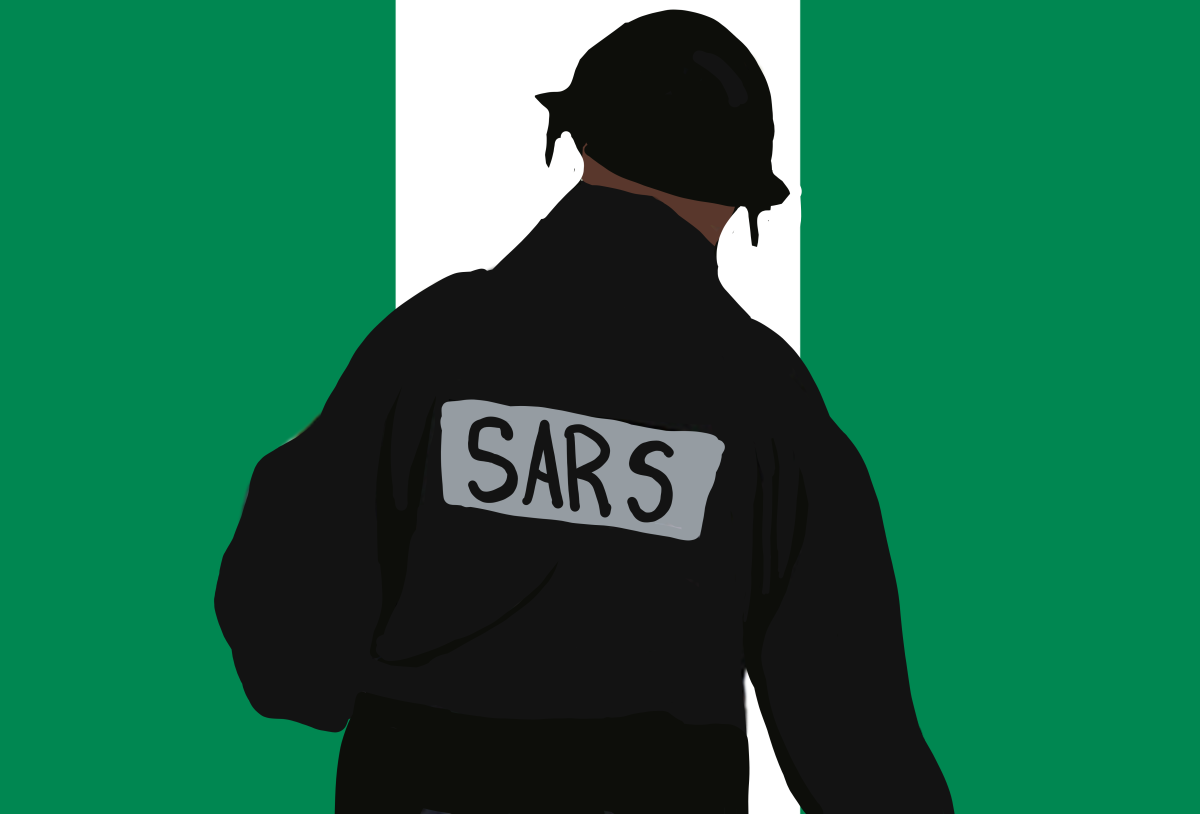Nigeria’s #EndSARS campaign
Young people protesting against police brutality is not unheard of in the U.S. In Nigeria, protests aiming to end the Special Anti-Robbery Squad (SARS) have gained global attention.
SARS is a special unit within the Nigerian police force that was created to deal with robbery and firearm related crimes. The unit quickly became associated with illegal activity and harming citizens. While the government has vowed reform in the past, the promises have been empty; the SARS officers continue to abuse their power unchecked.
Although this violence has been going on for quite some time, what sparked widespread outrage was a video of a man who was attacked and had his car stolen by SARS officers. This video spread quickly, with #EndSARS trending on multiple social media platforms. After an “overhaul” of the unit in 2018 that had no effect on the behavior of SARS officers, citizens were opposed to reform and demanded disbandment.
Prominent figures around the globe, from celebrities to politicians, commented on this movement, demanding change as well as donating to medical aid and legal funds for those affected. But the people who deserve the most respect are the thousands of young people in Nigeria who bravely protested. They were met with more brutality, which was the very thing they were protesting against; authorities used water cannons and opened fire on the protesters. Twelve people were killed by police during these protests and many were beaten and wounded.
SARS is treating the citizens they should protect with violence, with many cases of people reportedly being unjustly detained, tortured and killed. When citizens have to beg the police not to kill them, there is a clear infringement of human rights occurring. Between 2017 and 2020, Amnesty International revealed that there were at least 82 reported cases of torture and extrajudicial killings. Many Nigerian citizens who come in contact with the police feel extremely unsafe, and understandably so.
Younger people from low-income backgrounds are the predominant targets, as their poverty and vulnerability make them easier targets. When the officers see these youths who are dressed nice or have smartphones, they question them. The SARS officials immediately insist that any response they receive is a lie; if they do not have money to pay these officials off, they get injured, raped or killed, and sometimes all three. Innocent people are living in fear that their supposed protectors will brutalize them. These officers have authority and power, and without payment, the Nigerian citizens are subject to harsh, undeserved punishments.
This squad is also known to “confiscate” items without reason and commit extortion; many times those that are detained are forced to pay huge bribes, so they don’t have to face torture. The victims cannot even receive justice, due to obstacles and threats from the police authorities.
The SARS officers are perpetrating the very crimes that they should be fighting against. It is sickening the way that this police force, whose sole duty is to protect people, has turned into the very opposite.
Unfortunately, police corruption is common due to codes of silence and negligent accountability within systems. Not a single officer has been held responsible for these human rights violations.
However, on Oct. 11, 2020, SARS was disbanded. The president released this statement: “The Special Anti-Robbery Squad (SARS) of the Nigeria Police Force has been dissolved WITH IMMEDIATE EFFECT.” Although this seems like what citizens wanted, many are nervous if actual change will occur, especially since the officers from the controversial police unit will not be held accountable and will be redeployed to other police units.
While SARS was what ignited the protests, citizens were also attacked by non-SARS police forces. The dismantling of SARS is not enough. The systemic corruption proves that Nigeria needs a complete overhaul of the police system.
The citizens of Nigeria should not feel unsafe by the people in charge of protecting them. The failure of authorities addressing the police brutality fortifies the idea of impunity.
Although social media sometimes seems inherently performative and unlikely to yield results, the global pressure had a positive impact. The people of Nigeria are fighting the system bravely, but it should not be upon their shoulders alone.
When people around the world come together to fight against any type of oppression and corruption, pragmatic change can occur. While disbanding SARS is a good start, there is more that needs to be done. Just because SARS has been dissolved doesn’t mean awareness and donations should end. This is only a step towards solving this problem, not the solution.














































